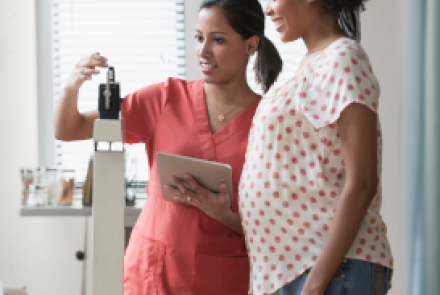A routine test during pregnancy can be lifesaving for your baby.
About 1 in 4 women carry group B strep (GBS), a common type of bacteria not normally dangerous to women, but that can have severe health implications for newborns. If left untreated, GBS can cause serious medical conditions, including the potentially life-threatening blood infection known as sepsis, in newborns.
A pregnant woman can pass GBS to her fetus during labor and delivery. Fortunately, there are ways to help protect babies from GBS, according to Rocio Villeda Gonzalez, MD, an obstetrician and gynecologist with Highland Medical, OBS-GYN of Rockland in New City, NY.
“Testing for GBS during pregnancy is crucial as there are antibiotic treatments mothers can take to prevent transmission,” says Dr. Gonzalez. “Screening and treatment of GBS has been shown to reduce sickness and death in newborns,” Dr. Gonzalez says.
The American College of Gynecology recommends all pregnant women be tested with a vaginal swab between 36 and 37 weeks of pregnancy. Even women who are planning a cesarean delivery should be screened, in case labor starts before the c-section.
Types of GBS Infection
There are two types of GBS infection in newborns: early-onset or late-onset.
“Early-onset GBS is more common and more dangerous as it often results in death,” Dr. Gonzalez explains. A baby usually gets sick with early-onset disease 12-48 hours after birth or up to the first six days. Symptoms include fever, fussiness, difficulty breathing, or grunting. GBS can cause severe problems, such as:
• inflammation of the covering of the brain or spinal cord (meningitis)
• infection of the lungs (pneumonia)
• infection in the blood (sepsis)
Babies with late-onset disease get sick between the first week and three months of life. In addition to fever and fussiness, a baby may develop a rash, have difficulty moving their limbs, or express pain when moving around.
A baby diagnosed with GBS will be treated in intensive care with antibiotics immediately. “Treatment is not always 100% effective, which is why prevention is so important,” Dr. Gonzalez advises.
Who Is at Increased Risk?
Some risk factors for GBS include:
• Going into labor at less than 37 weeks of pregnancy
• Having 18 hours or more pass between when a woman’s water breaks and when the baby is born
• Having a baby that is expected to be of low birth weight
• Having a previous newborn affected by GBS
Screening for GBS
Pregnant women between 36 and 37 weeks of pregnancy should be tested with a vaginal swab for GBS. Any woman who is found to have GBS or has ever had GBS in her urine will be treated with intravenous antibiotics at the start of labor. Penicillin or ampicillin is typically used to treat GBS. If a woman has an allergy to these medications, physicians will use an alternative antibiotic such as clindamycin or vancomycin.
“These antibiotics are most effective when received four hours before delivery as they take a few hours to work and get to the birth canal,” Dr. Gonzalez says. “A woman who knows she is GBS-positive shouldn’t delay in getting to the hospital when she knows she’s in labor.”
GBS screening is one of the many reasons you should be followed by a trusted healthcare provider for your prenatal care.
To make an appointment with Dr. Gonzalez, another obstetrician/gynecologist, or a certified nurse midwife at Highland Medical, OBS-GYN of Rockland, call 845-634-8400.






